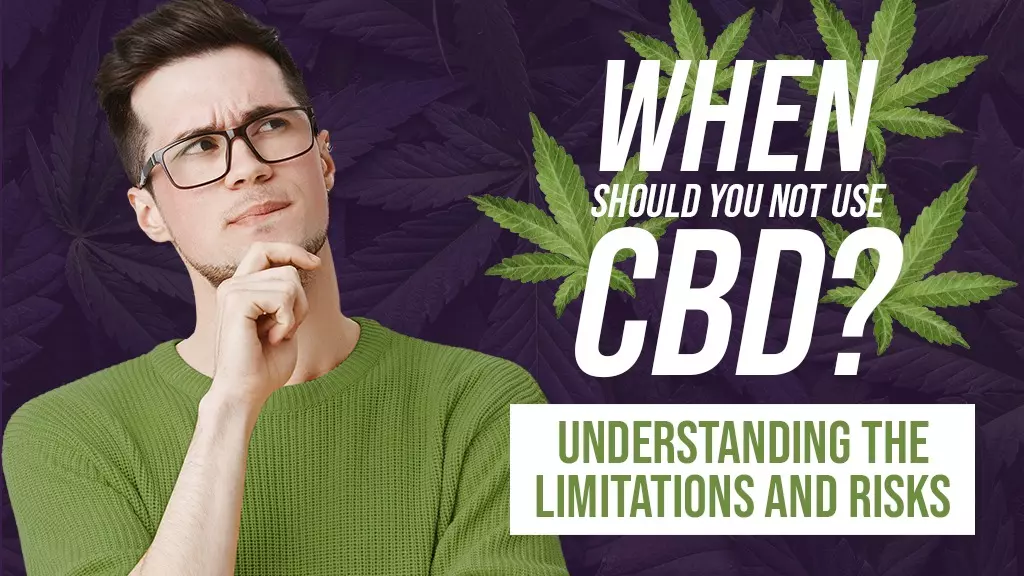Recent Posts
Post Catagories

In recent years, cannabidiol, or CBD, has garnered immense popularity as a natural remedy for a wide range of health issues. From anxiety and chronic pain to sleep disorders and inflammation, CBD has been hailed as a versatile and effective supplement. However, like any other substance, CBD is not without its limitations and potential risks. In this blog post, we will explore the situations and circumstances in which you should exercise caution or not use CBD altogether.
Do Not Use CBD When You’re Pregnant or Nursing
One of the first and most crucial considerations when it comes to using CBD is pregnancy and breastfeeding. The developing fetus and newborns are extremely sensitive to any foreign substances, including CBD. While research on CBD’s effects during pregnancy is still in its early stages, some studies have raised concerns about the potential impact on fetal development and breastfeeding infants. It’s essential to consult with a healthcare professional before using CBD if you are pregnant or nursing, who might recommend that you not use CBD.
Do Not Use CBD When You’re Taking Medications
CBD has the potential to interact with various medications due to its influence on certain enzymes in the liver, particularly cytochrome P450 enzymes. These enzymes are responsible for metabolising many drugs, and when CBD interferes with their activity, it can affect the way your body processes medications.
If you are taking prescription medications, especially those with a narrow therapeutic window or a “grapefruit warning,” it’s essential to consult your healthcare provider before introducing CBD into your routine, who could very well advice you not to use CBD. This includes medications for blood thinning, epilepsy, heart conditions, and certain psychiatric disorders. Your healthcare provider can help you adjust your medication regimen as needed to avoid any potential interactions.
Read More About Discover Which Drugs Are Incompatible With CBD?
Do Not Use CBD When You Have Liver Issues
The liver plays a crucial role in metabolising CBD, as mentioned earlier. If you have pre-existing liver conditions or impaired liver function, using CBD may be risky. The liver’s ability to process CBD and other substances may be compromised, leading to unexpected side effects or ineffective treatment. People with liver issues should consult their healthcare provider before using CBD to ensure it’s safe for them.
When You’re About To Operate Heavy Machinery
CBD, like some other compounds, can have mild sedative effects on some individuals. While CBD is generally considered non-intoxicating and non-psychoactive, it can still induce drowsiness and impair your ability to concentrate and react quickly. Therefore, it’s not advisable to use CBD if you’re about to operate heavy machinery, drive a vehicle, or engage in activities that require full attention and alertness. Always prioritise safety first.
Do Not Use CBD When You’re Under The Age Of 18
The safety and efficacy of CBD in children and adolescents are still being studied. While CBD has shown promise in some pediatric conditions, such as epilepsy, its long-term effects on developing brains are not yet fully understood. In many places, there are age restrictions on the sale and use of CBD products, typically set at 18 or 21 years old. It’s crucial to respect these age limits and consult with a pediatrician or healthcare provider if you are considering giving CBD to a child.
When You’re Looking For A Quick Fix
CBD is often promoted as a natural remedy for various health issues, but it’s not a magic cure-all. While it can provide relief for many people, it’s not a guaranteed solution, and its effects can vary from person to person. If you’re looking for a quick fix to address a severe medical condition or expecting immediate results, you might be disappointed. It’s essential to have realistic expectations and consult with a healthcare professional to explore all available treatment options.
When You’re Using Low-Quality Or Unverified CBD Products
The CBD market is flooded with a wide range of products, and not all of them are created equal. Using low-quality or unverified CBD products can pose significant risks. Some products may contain harmful contaminants, inconsistent CBD concentrations, or even trace amounts of THC, the psychoactive compound in cannabis. To ensure your safety and effectiveness, only purchase CBD products from reputable sources that provide third-party lab testing results and adhere to quality standards.
Read More About Is CBD Oil Available On Amazon?
Do Not Use CBD When You Have A History Of Substance Abuse
Individuals with a history of substance abuse, especially involving cannabis or other psychoactive substances, should exercise caution when considering CBD use. While CBD itself is not intoxicating, the familiarity of the act of smoking or consuming CBD products may trigger cravings or relapse in some individuals. It’s crucial to discuss your history of substance abuse with a healthcare professional before incorporating CBD into your routine.
When You’re Sensitive To Changes In Blood Pressure
CBD has been reported to cause changes in blood pressure, particularly in some individuals who are sensitive to such fluctuations. While for some, this may lead to a temporary drop in blood pressure, others may experience an increase. If you have a medical condition that requires stable blood pressure or are taking medications to regulate it, consult with your healthcare provider before using CBD to avoid potential complications.
Do Not Use CBD When You’re Not Willing To Do Your Research
Finally, when considering using to not using CBD, it’s essential to do your research and make informed decisions. Understanding the product you’re using, its source, dosage, and potential interactions is crucial for a safe and effective experience. If you’re not willing to invest time in learning about CBD and its implications, it may be best to reconsider using it altogether.
Conclusion
CBD has undoubtedly shown promise as a natural remedy for various health issues, but it’s not a one-size-fits-all solution. There are specific situations and circumstances in which you should exercise caution or avoid using CBD altogether. Whether you’re pregnant, taking medications, have underlying health issues, or fall into one of the other categories mentioned above, it’s crucial to consult with a healthcare professional before incorporating CBD into your routine. By doing so, you can make informed decisions that prioritise your health and well-being while minimising potential risks.

